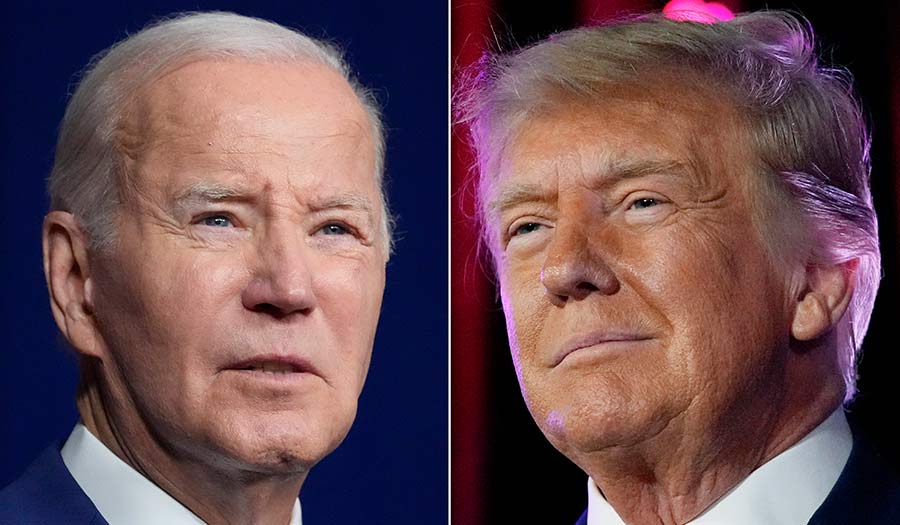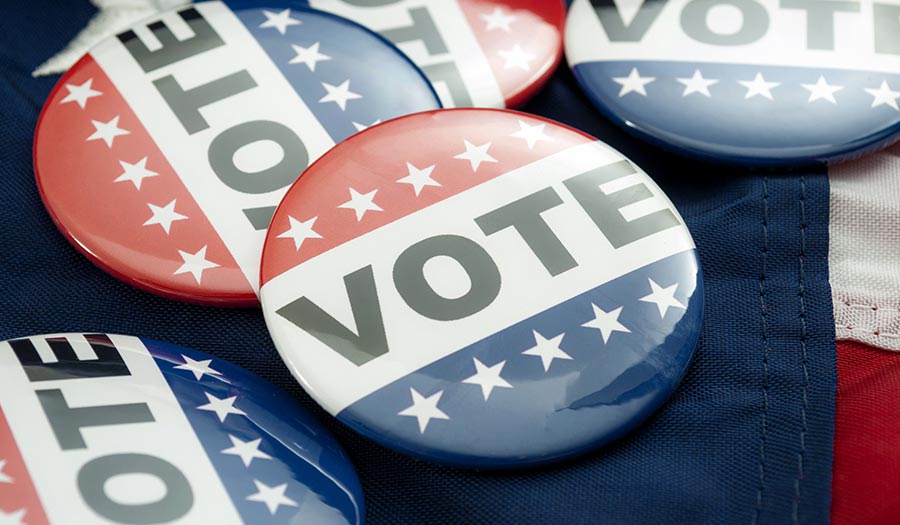 AP Photo
AP Photo
Article
Learn the why behind the headlines.
Subscribe to the Real Truth for FREE news and analysis.
Subscribe NowLONDON (AP) – More than 50 countries that are home to half the planet’s population are due to hold national elections in 2024. But the year looks set to test even the most robust democracies and to strengthen the hands of leaders with authoritarian leanings.
From Russia, Taiwan and the United Kingdom to India, El Salvador and South Africa, the presidential and legislative contests have huge implications for human rights, economies, international relations and prospects for peace in a volatile world.
In some countries, the balloting will be neither free nor fair. And in many, curbs on opposition candidates, weary electorates and the potential for manipulation and disinformation have made the fate of democracy a front-and-center campaign issue.
A possible rematch between President Joe Biden and his predecessor Donald Trump looms large in the election calendar—a Trump victory in November is perhaps the greatest global wildcard. Yet high-stakes votes before then also will gauge the “mood of dissatisfaction, impatience, uneasiness” among far-flung electorates, said Bronwen Maddox, director of the London-based think-tank Chatham House.
Votes with Global Impact
Taiwan’s elections for president and the 113-member legislature take place Saturday under intense pressure from China, which makes the outcome important to much of the Asia-Pacific region, as well as to the U.S.
Beijing has renewed its threat to use military force to annex the self-governing island it regards as its own territory, and described the elections as a choice between war and peace. None of the three leading presidential candidates has indicated a desire to try China’s resolve by declaring Taiwan’s independence.
That said, front-runner William Lai, who is currently Taiwan’s vice president, has promised to strengthen the island’s defense, and a victory by him could heighten cross-strait tensions. The opposition Nationalist Party, or Kuomintang, is more amenable to Beijing than Lai’s Democratic People’s Party.
Taiwan’s 23 million people overwhelmingly favor maintaining the island’s de facto independence through self-rule. Domestic issues such as housing and health care therefore are likely to play a deciding role in the presidential race.
Leaders Look to Tighten Their Grips
Bangladeshi Prime Minister Sheikh Hasina, the world’s longest-serving female leader, won a fourth successive term Monday in an election that opposition parties boycotted and preceded by violence. Ms. Hasina’s Awami League party was reelected on a low turnout of 40 percent, and the stifling of dissent risks triggering political turmoil.
India, the world’s most populous country, is due to hold a general election by mid-2024 that is likely to bring Prime Minister Narendra Modi of the right-wing Hindu nationalist Bharatiya Janata Party a third consecutive term.
To his supporters, Mr. Modi is a political outsider who has cleaned up after decades of corruption and made India an emerging global power. Critics say assaults on the press and free speech, as well as attacks on religious minorities by Hindu nationalists, have grown brazen on his watch.
Another leader seeking to retain power is El Salvador President Nayib Bukele, who has won widespread support since using emergency powers for an aggressive crackdown on ultra-violent street gangs.
A Supreme Court filled by his party’s appointees cleared Mr. Bukele to run on February 4 despite a constitutional ban on presidents serving two consecutive terms. While foreign governments have criticized the suspension of some civil rights, Mr. Bukele is not expected to face serious competition.
Milestones—and More of the Same
Mexico is poised to elect its first female president on June 2—either former Mexico City Mayor Claudia Sheinbaum, a protege of President Andres Manuel Lopez Obrador, or a former opposition senator, Xochitl Galvez. The winner will govern a country with daunting drug-related violence and an increasingly influential military.
Voters in Indonesia, Southeast Asia’s largest democracy, are choosing a successor to President Joko Widodo on February 14. Opinion polls indicate a close race between Defense Minister Prabowo Subianto, a right-wing nationalist, and former Central Java Gov. Ganjar Pranowo, the governing party’s candidate.
Mr. Subianto’s running mate is outgoing leader Widodo’s son, prompting speculation of a dynasty in the making. Either winner, though, would mark a continuation of the corruption-tainted politics that have dominated Indonesia since the end of the Suharto dictatorship in 1998.
Pakistan’s February 8 parliamentary election also is being contested by well-established politicians, under the eye of the country’s powerful military. Former Prime Minister Imran Khan, a popular opposition figure, is imprisoned, and election officials blocked him from running.
His rival, three-time Prime Minister Nawaz Sharif, the leader of the Pakistan Muslim League, was allowed on the ballot after his corruption convictions were overturned. Also running is the Pakistan Peoples Party led by former Foreign Minister Bulawal Bhutto Zardari.
Analysts say the election is likely to produce a shaky government. The vote may be postponed amid plummeting relations with Taliban-controlled neighbor Afghanistan and deadly attacks on Pakistani security forces.
Has Populism Peaked?
Populism gained ground in Europe as the continent experienced economic instability and mass migration from elsewhere. June elections for the parliament of the 27-nation European Union will be a sign of whether traditional parties can see off populist rivals, many of which are skeptical of military support for Ukraine.
Last year’s national elections produced mixed signals: Slovakia elected pro-Russia populist Prime Minister Robert Fico, but voters in Poland replaced a conservative government with a coalition led by centrist Donald Tusk.
Mujtaba Rahman of political consultancy Eurasia Group predicted that the upcoming European Parliament races will not produce a populist majority but “the center will lose ground compared to the last vote” in 2019.
In former EU member Britain, populism found expression in the 2016 Brexit referendum and the turbulent term of former Prime Minister Boris Johnson. A UK general election this year will pit the governing Conservatives against the center-left Labour Party, which is firmly ahead in opinion polls as it seeks to regain power after 14 years.
Democracy’s Challenges in Africa
Climate change, disrupted grain supplies from the Ukraine war, and increasing attention from China and Russia are among the forces reshaping Africa, the world’s fastest-growing continent.
Eight West African countries have had military coups since 2020, including Niger and Gabon in 2023.
Senegal is regarded as a bastion of stability in the region. Now that President Macky Sall is stepping down, his country’s February 25 election is seen as an indicator of the country’s political resilience.
Supporters of opposition leader Ousmane Sonko accuse the government of trying to stop him from running with a series of legal cases that have sparked deadly protests. The presidential election could “mark a return to the norms of previous years or signal a lasting shift towards more volatile politics,” said Eurasia group analyst Tochi Eni-Kalu.
In South Africa, a legislative election due between May and August has a struggling economy, crippling power blackouts and an unemployment rate of nearly 32 percent as the political backdrop. Overcoming voter disillusionment will be a challenge for the long-dominant African National Congress.
The ANC has held the presidency and a majority in parliament since the end of the country’s apartheid system in 1994, but the previously revered organization won less than half the vote in 2021 local elections.
If its support drops below 50 percent, the party will need to form a coalition to ensure that lawmakers reelect President Cyril Ramaphosa.
South Sudan, the world’s youngest country, plans to hold its long-delayed first elections in December. The balloting would represent a key milestone but could be rife with danger and vulnerable to failure under current conditions.
Nicholas Haysom, who heads the UN mission in the country, told the Security Council last month that voter registration details, a security plan and a way to resolve disputes are among the missing elements needed to ensure free elections that are “deemed credible and acceptable to South Sudanese citizens.”
Rubber-Stamp Exercises
There is little doubt about who will win Russia’s presidential election in March. President Vladimir Putin faces only token opposition in his bid for a fifth term. His main rivals are in prison, in exile or dead, and a politician calling for peace in Ukraine was disqualified.
It is a similar story in Belarus, led by President Alexander Lukashenko. On February 25, the country is expected to hold its first parliamentary election since Mr. Lukashenko’s government crushed protests against the Putin ally’s disputed 2020 reelection. Thousands of opponents are in prison or have fled the country.
Still, for all its problems, the democratic ideal retains widespread appeal, even for authoritarian leaders, Ms. Maddox said.
“The fact that they choose to hold elections shows that they see the value of claiming to have a free vote,” she said.
To learn God’s perspective about voting, read Do Christians Vote?
- Personals
- POLITICS
 Do Christians Vote?
Do Christians Vote?


